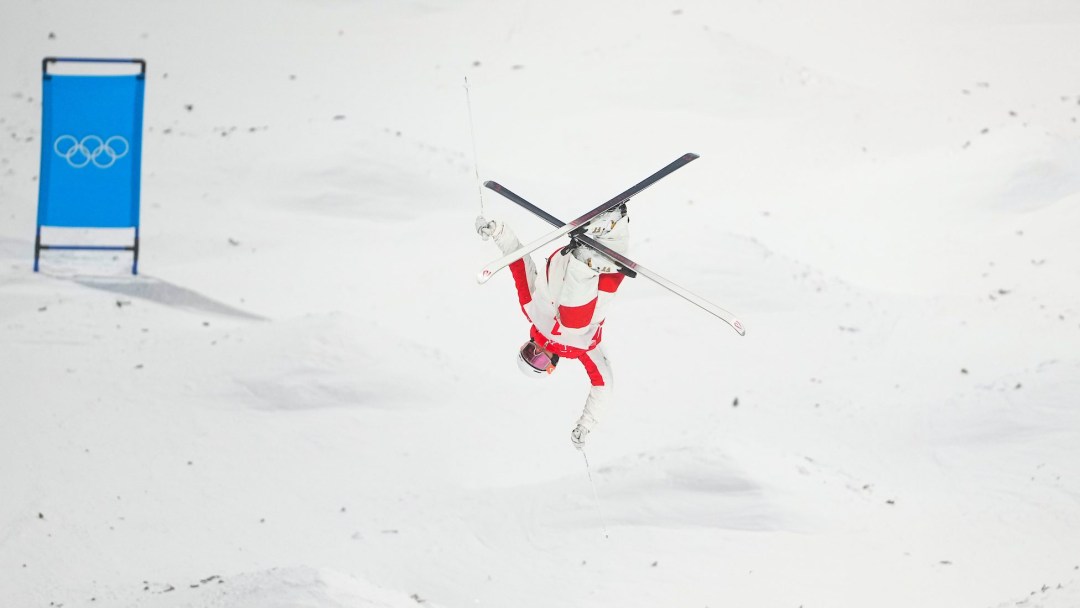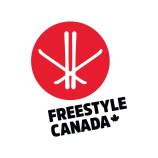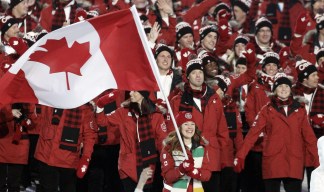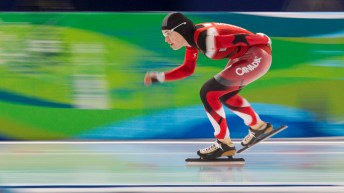Freestyle Skiing
Team Canada Medal Count
Sport Overview
Freestyle Skiing at Milano Cortina 2026
Venues: Livigno Aerials & Moguls Park, Livigno Snow Park
Competition Dates: February 7, 9-12, 14-21 (Days 1, 3-6, 8-15)
Events: 15 (7 men, 7 women, 1 mixed)
| Men’s Events | Women’s Events | Mixed Events |
|---|---|---|
| Men’s Aerials Men’s Moguls Men’s Dual Moguls Men’s Ski Cross Men’s Freeski Halfpipe Men’s Freeski Slopestyle Men’s Freeski Big Air | Women’s Aerials Women’s Moguls Women’s Dual Moguls Women’s Ski Cross Women’s Freeski Halfpipe Women’s Freeski Slopestyle Women’s Freeski Big Air | Mixed Team Aerials |
Freestyle skiing includes seven individual events for each gender, six of which include a judged component as skiers are evaluated on their technical skills.
Moguls and Dual Moguls
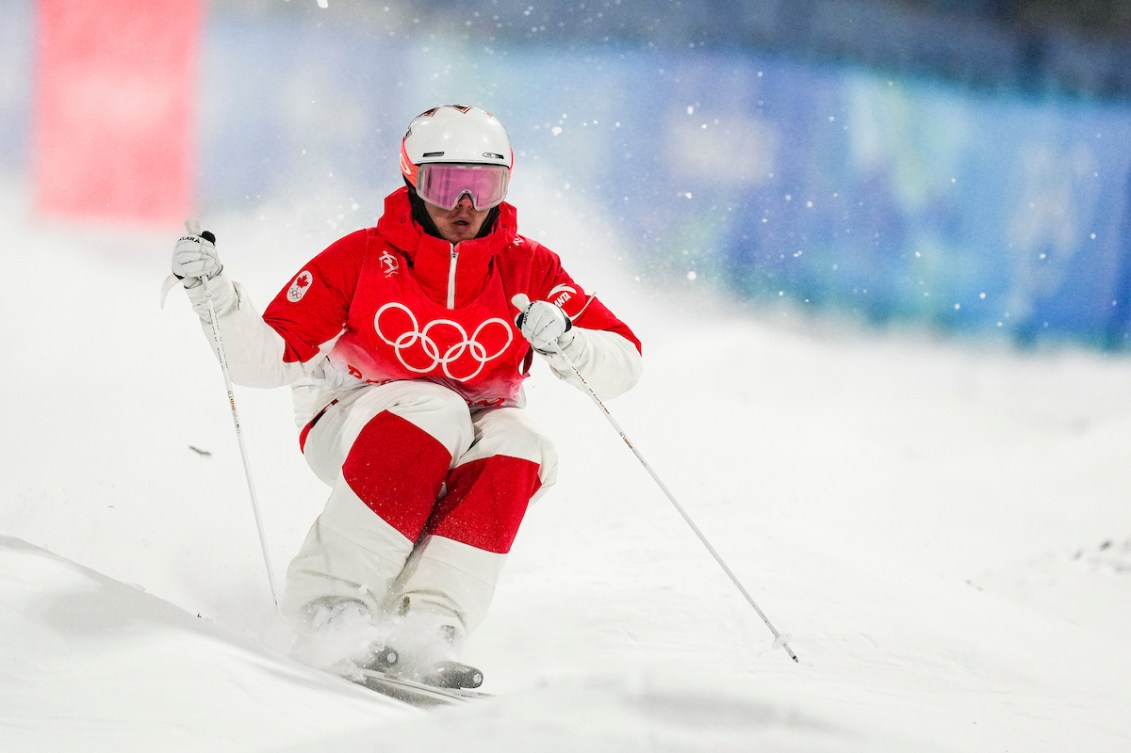
In moguls and dual moguls, skiers travel down a course of snow bumps, performing two aerial tricks as they go.
In moguls, the quality of the turns through those bumps is most important. Scored by five judges, turns account for 60% of the final score. Two more judges mark the quality and technical difficulty of the two aerial tricks for 20% of the score. The speed score, based on the time it takes for a skier to get down the course, makes up the final 20%. Competition begins with a qualification round, from which skiers advance to a multi-stage final that ends up with six skiers competing for the medals.
In dual moguls, which will make its Olympic debut at Milano Cortina 2026, two athletes compete head-to-head on parallel courses. From each pairing, the winner advances to the next round of the competition bracket. Eventually, two semifinal winners face off for gold and silver in the Big Final while two semifinal losers battle for bronze in the Small Final. The turns account for 50% of the score, with the air score and speed score each counting for 25%.
Aerials and Mixed Team Aerials
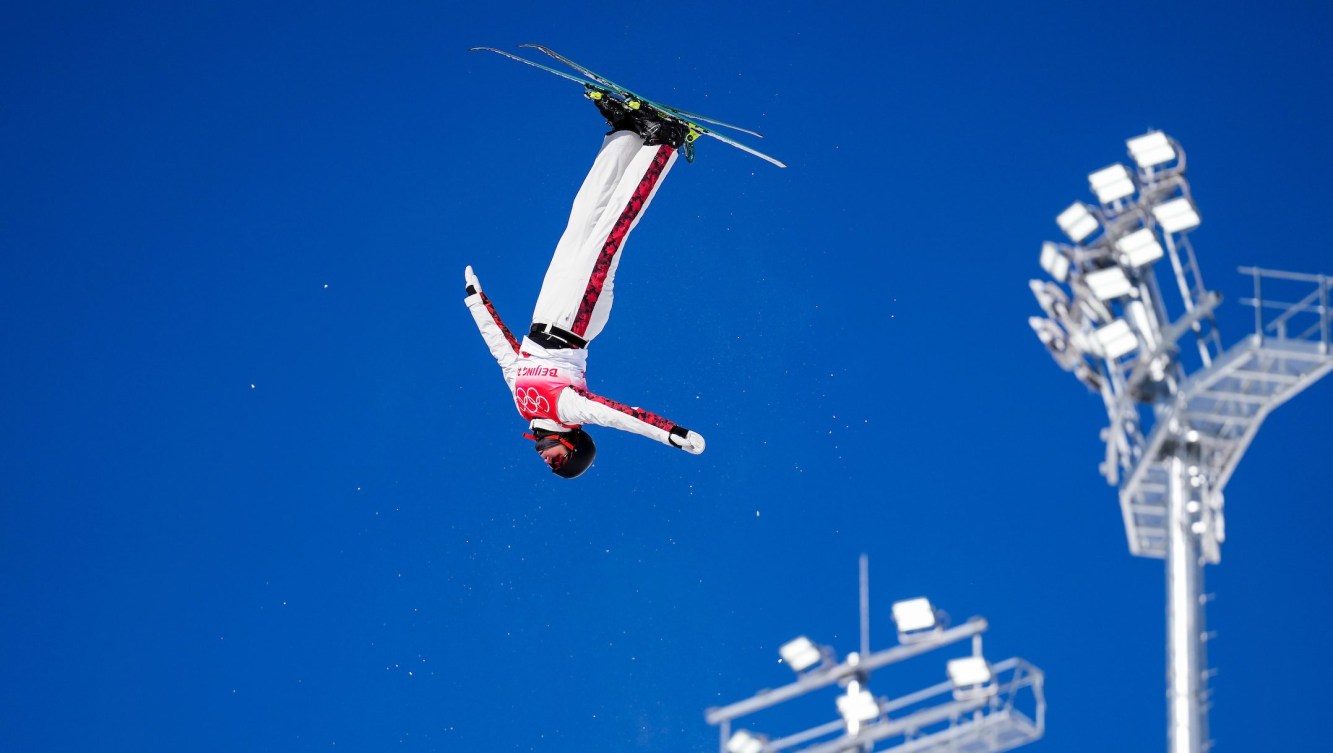
In aerials, skiers perform some of the most difficult acrobatic maneuvers in any sport, with up to five twists and three flips while in the air for just three seconds. Five judges evaluate each jump. The air (which includes the takeoff, height and distance) is worth 20%. The form of the skier in the air is worth 50% while the landing of the jump makes up the last 30% of the score, which is then multiplied by the jump’s degree of difficulty.
In the individual events, competition begins with a two-jump qualification round, from which 12 skiers advance to the finals. After two rounds of jumping in the finals, the top six skiers based on their best single jump score compete for the medals in a one-jump Super Final.
In mixed team aerials, each team consists of three athletes, which can be a combination of two men and one woman or vice versa. Their individual scores are added together to get the team total. From the qualification round, eight teams advance to the finals with the top four moving on to the Super Final.
Halfpipe
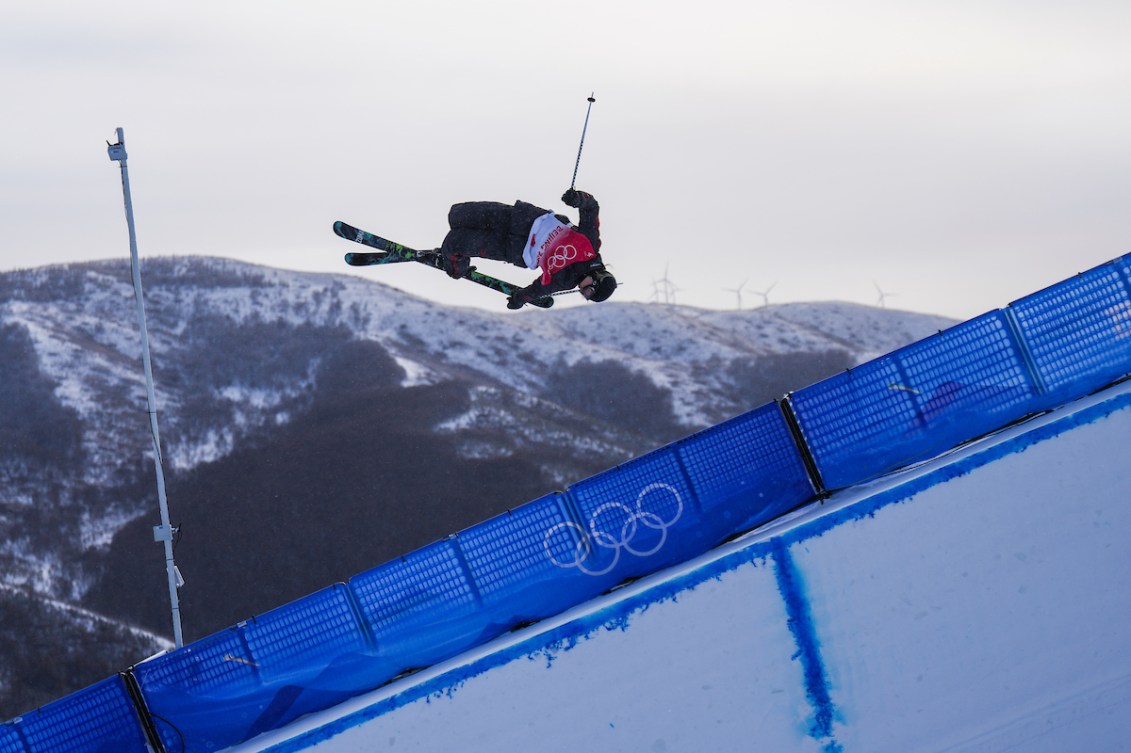
In halfpipe, which takes place in a 6.7 metre-wide sloped channel of snow, a panel of judges scores each run out of 100 on its overall impression, taking into account the amplitude and style as well as the diversity, difficulty, and execution of the tricks. The judges’ scores are then averaged.
Qualification rounds are best-of-two runs. In the final, each athlete gets three run attempts with only their single best run score counting towards the results.
Slopestyle and Big Air
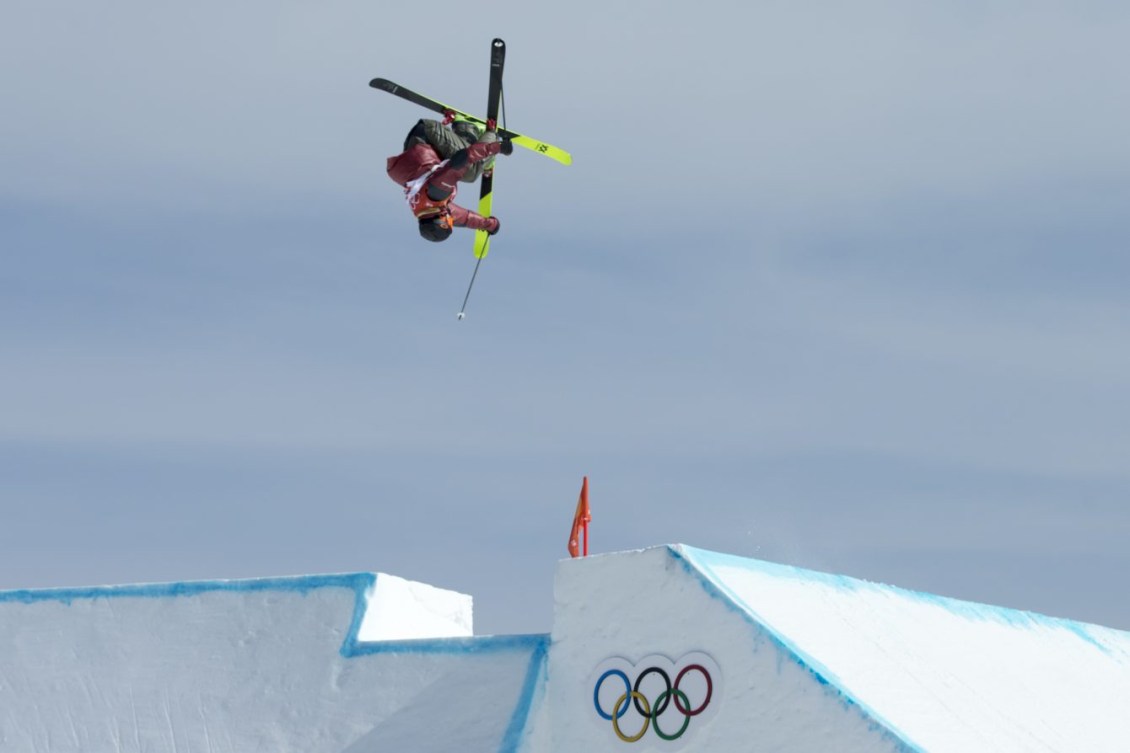
In slopestyle, which sees skiers go down and over a series of rail and jump features, some judges will score each run on the composition while others focus on the tricks performed in particular sections of the course. With the scoring again out of 100, the tricks judges will account for 60% of the total score with the composition judges accounting for 40%.
In big air, each skier performs a single trick off a kicker after travelling down a long ramp. Again, each trick is scored out of 100 by the judges who have their scores averaged.
In slopestyle finals, only a skier’s single best run score will be counted. In big air finals, the best two scores from a skier’s three runs will be added together to produce the results.
Ski Cross
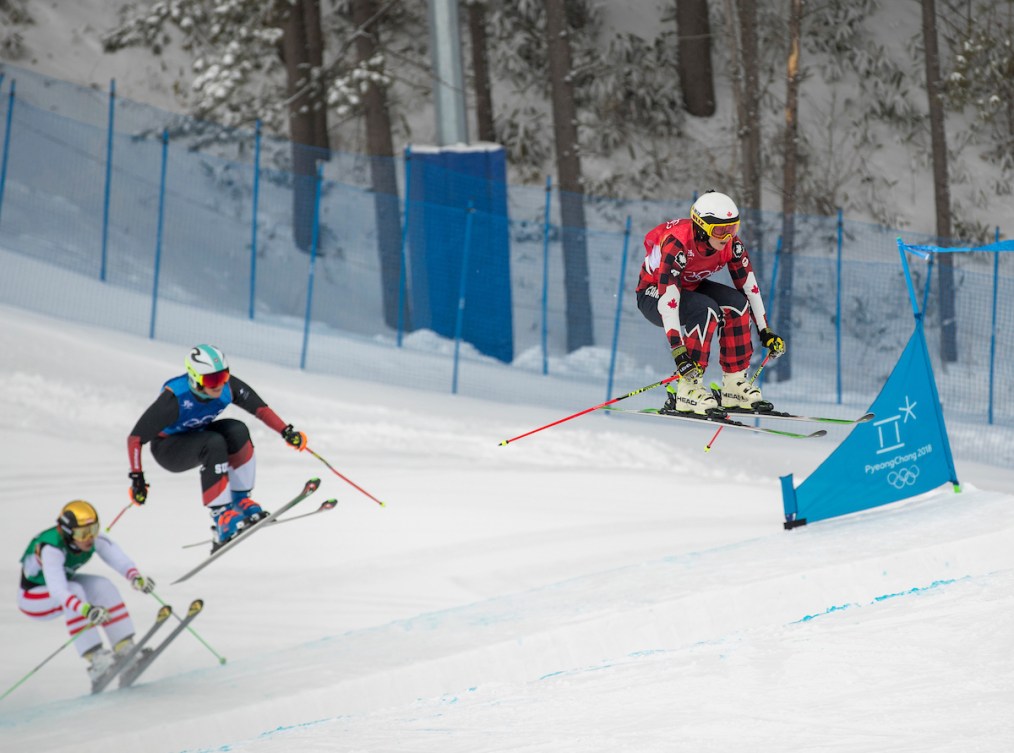
Ski cross is the lone freestyle skiing event without a judged component. Within Canada, the National Sport Organization is Alpine Canada rather than Freestyle Canada. Most ski cross athletes have transitioned from being alpine skiers.
Ski cross is all about speed as skiers race four at a time down a course composed of various features such as banks, jumps, rollers and turns. Competition begins with a timed qualification run to seed the competitors into single elimination heats. The top two in each heat advance to the next round, until just four competitors remain to race in the Big Final for the medals.
Canadian Olympic Freestyle Skiing History (pre-Milano Cortina 2026)
Canada has a long history of excelling in freestyle skiing, with 30 Olympic medals won since the sport’s official debut at Albertville 1992.
Nine of those came at Sochi 2014, the most of any country. In men’s moguls, Alex Bilodeau won his second straight gold medal, edging out teammate Mikaël Kingsbury. There was also a gold-silver finish in the women’s moguls event where Justine Dufour-Lapointe shared the podium with older sister Chloé. That was matched in women’s ski cross where Marielle Thompson won gold ahead of teammate Kelsey Serwa. Another double podium came in women’s slopestyle, with Dara Howell winning gold while Kim Lamarre claimed bronze. Rounding out the medals in Sochi was Mike Riddle with his men’s halfpipe silver.
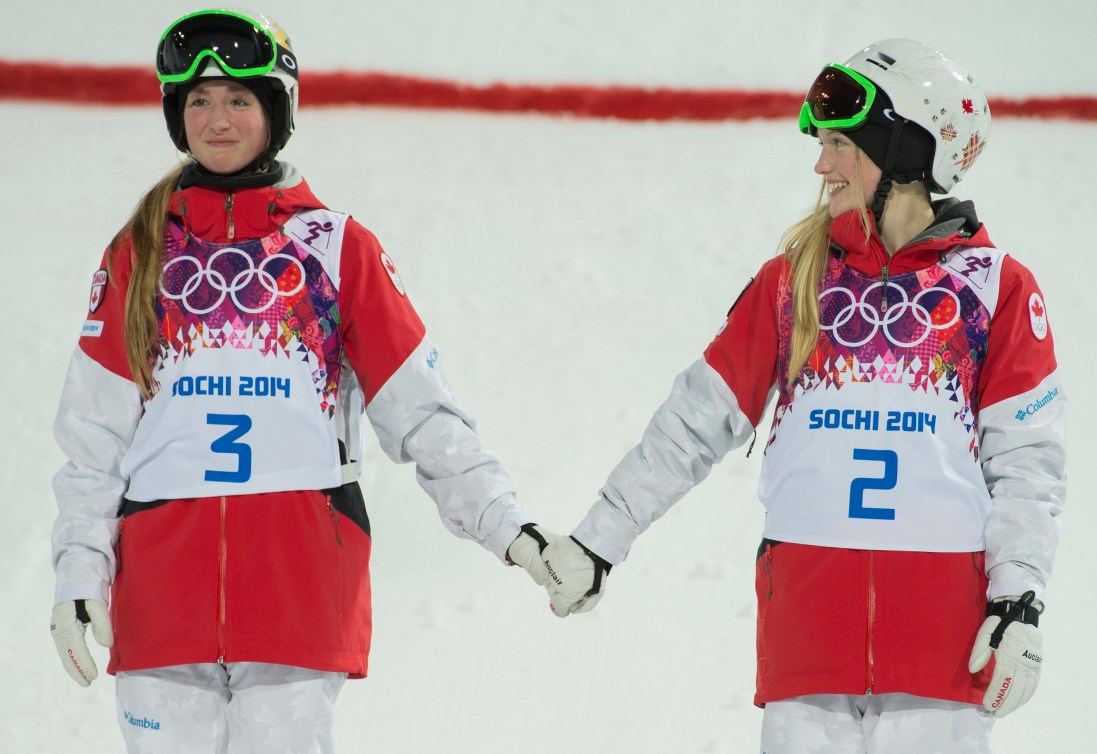
Another seven medals were won at PyeongChang 2018. Kingsbury, viewed by many as the greatest moguls skier of all-time, cemented his status with an Olympic gold medal. Justine Dufour-Lapointe claimed moguls silver for her second straight Olympic medal. Canada boasted another 1-2 finish in women’s ski cross as Serwa took the gold with teammate Brittany Phelan winning silver. Brady Leman earned the top spot in men’s ski cross. Cassie Sharpe dominated the women’s halfpipe to win gold while Alex Beaulieu-Marchand grabbed the bronze in men’s slopestyle.
Five medals were added at Beijing 2022. Sharpe and Rachael Karker shared the podium in women’s halfpipe, winning silver and bronze, respectively. Kingsbury claimed another silver in men’s moguls for his third career Olympic medal. Thompson won silver in women’s ski cross, keeping Canada on the podium in that event for the fourth straight Games. The trio of Marion Thénault, Miha Fontaine, and Lewis Irving won bronze in the inaugural mixed team aerials event.
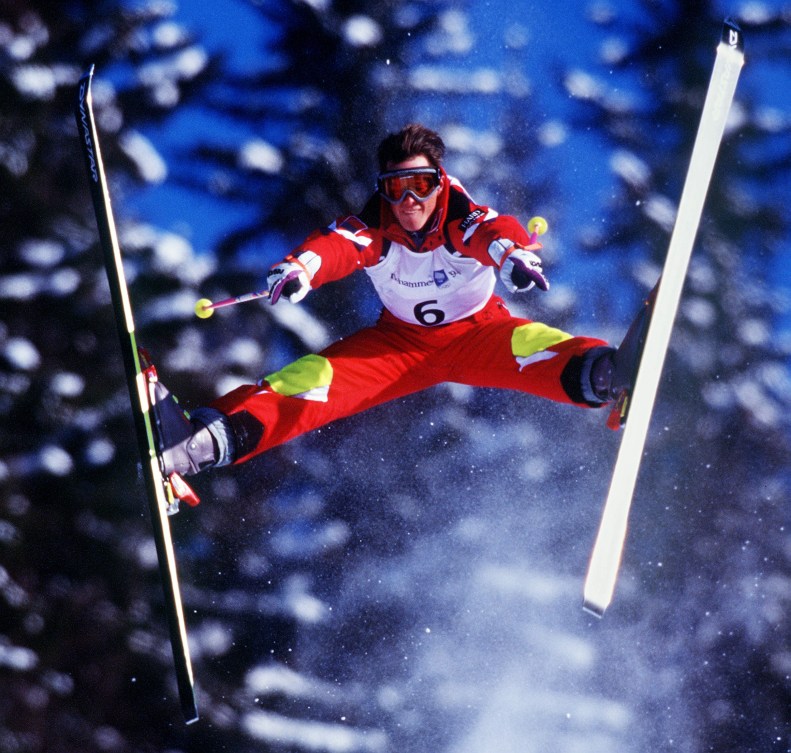
Canada’s first Olympic freestyle skiing medals were won at Lillehammer 1994 where Jean-Luc Brassard won men’s moguls gold while Philippe LaRoche and Lloyd Langlois captured men’s aerials silver and bronze. Another shared podium followed at Salt Lake City 2002 where Veronica Brenner and Deidra Dionne won women’s aerials silver and bronze.
At Turin 2006, the star was Jennifer Heil with her women’s moguls gold. Four years later she won silver at Vancouver 2010, where Ashleigh McIvor won the first ever Olympic gold in women’s ski cross.
Olympic Freestyle Skiing History
Freestyle skiing was featured as a demonstration sport at Calgary 1988 with moguls, aerials, and ballet events. At Albertville 1992, moguls became the first freestyle event to gain official Olympic medal status, while aerials and ballet remained demonstration events.
At Lillehammer 1994, aerials joined moguls as an official Olympic event. The next program change for freestyle skiing didn’t come until Vancouver 2010 when ski cross was added. The Olympic program increased to five events per gender at Sochi 2014 with the addition of halfpipe and slopestyle. At Beijing 2022, big air was added along with the mixed team aerials event.
Canadian Medallists
| Games | Event | Athlete | Finish |
|---|---|---|---|
| Lillehammer 1994 | Men's Moguls | Jean-Luc Brassard | Gold |
| Turin 2006 | Women's Moguls | Jennifer Heil | Gold |
| Vancouver 2010 | Men's Moguls | Alex Bilodeau | Gold |
| Vancouver 2010 | Women's Ski Cross | Ashleigh McIvor | Gold |
| Sochi 2014 | Women's Moguls | Justine Dufour-Lapointe | Gold |
| Sochi 2014 | Men's Moguls | Alex Bilodeau | Gold |
| Sochi 2014 | Women's Slopestyle | Dara Howell | Gold |
| Sochi 2014 | Women's Ski Cross | Marielle Thompson | Gold |
| PyeongChang 2018 | Men's Mogul | Mikael Kingsbury | Gold |
| PyeongChang 2018 | Women's Ski Halfpipe | Cassie Sharpe | Gold |
| PyeongChang 2018 | Men's Ski Cross | Brady Leman | Gold |
| PyeongChang 2018 | Women's Ski Cross | Kelsey Serwa | Gold |
| Lillehammer 1994 | Men's Aerials | Philippe LaRoche | Silver |
| Salt Lake City 2002 | Women's Aerials | Veronica Brenner | Silver |
| Vancouver 2010 | Women's Moguls | Jennifer Heil | Silver |
| Sochi 2014 | Women's Moguls | Chloé Dufour-Lapointe | Silver |
| Sochi 2014 | Men's Moguls | Mikaël Kingsbury | Silver |
| Sochi 2014 | Men's Halfpipe | Mike Riddle | Silver |
| Sochi 2014 | Women's Ski Cross | Kelsey Serwa | Silver |
| PyeongChang2018 | Women's Mogul | Justine Dufour-Lapointe | Silver |
| PyeongChang 2018 | Women's Ski Cross | Brittany Phelan | Silver |
| Beijing 2022 | Men's Moguls | Mikaël Kingsbury | Silver |
| Beijing 2022 | Women's Ski Cross | Marielle Thompson | Silver |
| Beijing 2022 | Women's Halfpipe | Cassie Sharpe | Silver |
| Lillehammer 1994 | Men's Aerials | Lloyd Langlois | Bronze |
| Salt Lake City 2002 | Women's Aerials | Deidra Dionne | Bronze |
| Sochi 2014 | Women's Slopestyle | Kim Lamarre | Bronze |
| PyeongChang 2018 | Men's Slopestyle | Alex Beaulieu-Marchand | Bronze |
| Beijing 2022 | Mixed Team Aerials | Marion Thénault, Miha Fontaine, Lewis Irving | Bronze |
| Beijing 2022 | Women's Halfpipe | Rachael Karker | Bronze |
Teams
Beijing 2022
- Amy Fraser
- Brady Leman
- Brendan Mackay
- Brittany Phelan
- Cassie Sharpe
- Chloé Dufour-Lapointe
- Courtney Hoffos
- Édouard Therriault
- Elena Gaskell
- Émile Nadeau
- Evan McEachran
- Flavie Aumond
- Hannah Schmidt
- Jared Schmidt
- Justine Dufour-Lapointe
- Kevin Drury
- Laurent Dumais
- Lewis Irving
- Marielle Thompson
- Marion Thénault
- Max Moffatt
- Megan Oldham
- Miha Fontaine
- Mikaël Kingsbury
- Naomy Boudreau-Guertin
- Noah Bowman
- Olivia Asselin
- Rachael Karker
- Reece Howden
- Simon d’Artois
- Sofiane Gagnon
- Teal Harle
PyeongChang 2018
- Alex Beaulieu-Marchand
- Alex Bellemare
- Andi Naude
- Audrey Robichaud
- Brady Leman
- Brittany Phelan
- Cassie Sharpe
- Catrine Lavallée
- Chloé Dufour-Lapointe
- Chris Del Bosco
- Dara Howell
- Dave Duncan
- Evan McEachran
- India Sherret
- Justine Dufour-Lapointe
- Kelsey Serwa
- Kevin Drury
- Kim Lamarre
- Lewis Irving
- Marc-Antoine Gagnon
- Marielle Thompson
- Mikaël Kingsbury
- Mike Riddle
- Noah Bowman
- Olivier Rochon
- Philippe Marquis
- Roz Groenewoud
- Simon d’Artois
- Teal Harle
- Yuki Tsubota
Sochi 2014
- Alex Beaulieu-Marchand
- Alex Bilodeau
- Audrey Robichaud
- Brady Leman
- Chloé Dufour-Lapointe
- Chris Del Bosco
- Dara Howell
- Dave Duncan
- Georgia Simmerling
- Justin Dorey
- Justine Dufour-Lapointe
- Kaya Turski
- Kelsey Serwa
- Keltie Hansen
- Kim Lamarre
- Marc-Antoine Gagnon
- Marielle Thompson
- Matt Margetts
- Maxime Dufour-Lapointe
- Mikaël Kingsbury
- Mike Riddle
- Noah Bowman
- Philippe Marquis
- Roz Groenewoud
- Travis Gerrits
- Yuki Tsubota

